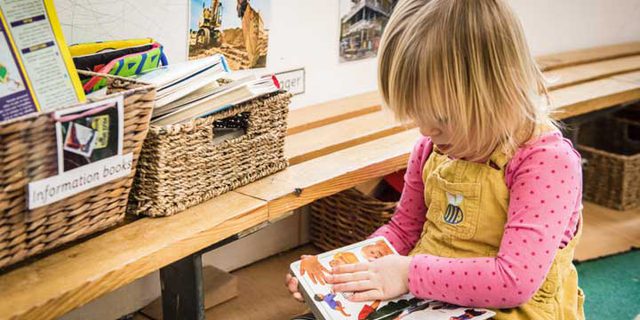Professor Tina Bruce responds to UCL's Institute of Education's new research on the use of phonics in schools.
This week UCL's Institute of Education's latest research was published - Reading wars or reading reconciliation? It examines the use of phonics as the main method used in England's schools to teach reading.
You can read the full research report on UCL's website: Reading wars or reading reconciliation? A critical examination of robust research evidence, curriculum policy and teachers' practices for teaching phonics and reading and Professor Alice Bradbury's article about her research on The Guardian website: Why are ministers obsessed with teaching children to read using phonics?
In response to the research findings, an open letter has been sent to the Education Secretary, Nadhim Zahawi, calling for urgent changes to be made to how children are taught to read. The letter has been signed by over 250 people working in children's education, including primary school headteachers, academics and children's author Michael Rosen.
The Froebel Trust supports this call for reform and a change to government policy.
Professor Tina Bruce has written this response on behalf of the Froebel Trust:
The evidence showing how to develop high quality literacy and a love of literature and writing throughout life chimes with the educational framework pioneered by Friedrich Froebel (1782-1852).
His approach continues to be effective today in developing the kind of literary experiences which lead to a lifelong enjoyment of communication, informed discussion, reading and writing. This is different from learning to use flash cards with lists of unrelated words in isolation so as to score on a test (a phonics check).
Instead reading for meaning is emphasised with a focus on language development and a range of phonic strategies, rather than one type of phonics being promoted as the only teaching method.
Some languages, such as Welsh, Italian or Finnish benefit from phonics as the main approach. English is one of the most irregular languages and so children need teachers who support them to use a range of semantic, syntax and phonic ways.
Different children need different help and teachers who know how to give this. Informed observation is key to identifying a child’s strengths and building on these so that children relish and seek stories, poetry and song arising from their experience.
Reading helps writing and writing helps reading, and language and discussion, being read to, seeing adults writing and good communication helps everything. Everything links and is interdependent. Children are then encouraged to actively enjoy the process of becoming literate with support for their intellectual life to flourish.
Interested in finding out more about a Froebelian approach to early education, literacy and communication?
- Valuing young children's signs of learning - A Froebel Trust funded research report by Rosie Flewitt, Kate Cowan, UCL, Institute of Education (completed in 2020)
- Putting storytelling at the heart of early childhood practice - Winner of Nursery World award for best professional book in 2021. The authors use a compelling Froebelian approach to explore the role of storytelling not just in the development of literacy but also in the development of communication and language.
- Expanding understandings of young children’s mark-making, drawing and writing within self-initiated play - A Froebel Trust funded research project by Dr Kate Smith, Canterbury Christ Church University (completed in 2018)
- Our reading list - A useful list of key texts for those seeking a more in-depth understanding of a Froebelian approach to early childhood education.
About Professor Tina Bruce
Professor Tina Bruce is an honorary visiting professor of Early Childhood Studies at Roehampton University. Tina trained as a primary teacher at the Froebel Educational Institute, now part of Roehampton University. She went on to become a Froebelian educator guided by principles that promote a holistic approach to teaching young children. She is best known for her ability to interweave Froebelian theory and practice, and for developing the 10 Principles of Early Childhood in her first book, published in 1987. She has since written and edited many books, including Developing Learning in Early Childhood: 0-8 Years and Essentials of Literacy from 0-7: A Whole-Child Approach to Communication, Language and Literacy with Jenny Spratt.
Tina played an instrumental role in laying the foundations of early education as co-ordinator of the Early Years Advisory Group to successive Government childcare ministers for 10 years. In 2008, she was awarded a CBE for services to early years education. She is a Vice President of BAECE: Early Education, Patron of the Centre for Literacy in Primary Education (CLPE), Member of the International Froebel Society Committee, Associate Member of the Froebel Trust, and Member of the Froebel Network.


